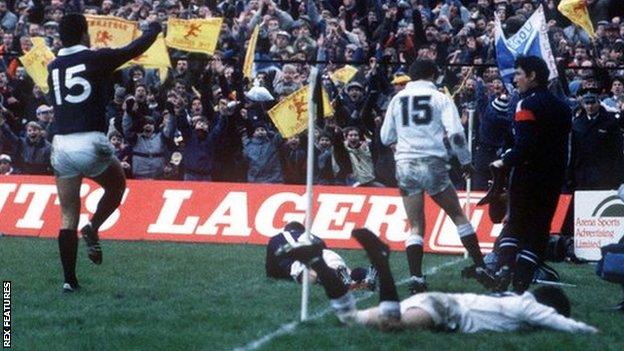Matt Duncan: 'Rugby mindset' helps former Scotland wing tackle MS symptoms
- Published

Matt Duncan scored a try in Scotland's 33-6 hammering of England in 1986
Former Scotland rugby international Matt Duncan says his "playing mindset" is helping him deal with the symptoms of multiple sclerosis.
Duncan famously scored a crucial try at the first Rugby World Cup in 1987 to earn Scotland a draw with France.
The 60-year-old revealed he had been diagnosed with secondary progressive MS in December.
"It's not like getting injured while playing rugby," Duncan told BBC Radio Scotland's John Beattie programme.
"In rugby, you get injured, you get treatment, you recover and you get back playing again.
"Even big and bad injuries, the mindset is that you always get back. That's my kind of approach, though it doesn't work like that.
"My MS won't get any better, but I can manage the symptoms so that I can keep going."
Former wing Duncan won 18 caps and scored seven tries in an international career spanning three years from 1986 to 1989.
He says he first developed symptoms around the age of 35 but shied away from investigating the root cause.
"I had some paralysis in my arm out of nowhere," he said. "The medics thought at first it might be a stroke, but following the tests, it was clear that it wasn't a stroke but it was something that needed further investigation.
"Even back then, I had an MRI scan and a lumbar puncture and those are still the two key pieces of work to establish what was wrong.
"I feel that there wasn't enough detail in either of those things to make a definitive decision.
"They were reluctant to make a diagnosis and I don't think I was looking for one either. I didn't seek it."
While struggling to come to terms with how the disease has affected his motor skills, Duncan is keen to maintain a positive attitude.
"I have a tremor in my hand, I don't write," he added. "My balance is dreadful and that's quite hard when you are used to being a player.
"You're used to your body being strong and any kind of change in that means you have to have a different psychological profile.
"I'm very lucky, I have secondary progressive MS - that's the latter stage.
"I'm very lucky that I'm able to get around and do as much as I do. There are lots of folk who are much worse and struggle much more than I do."